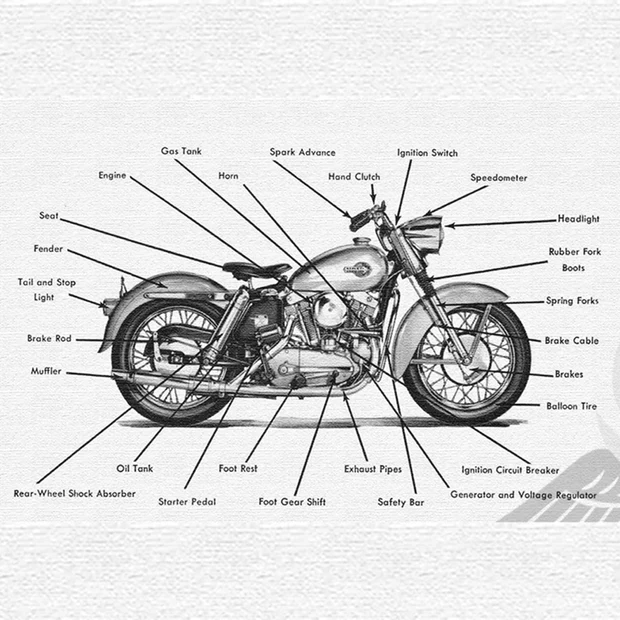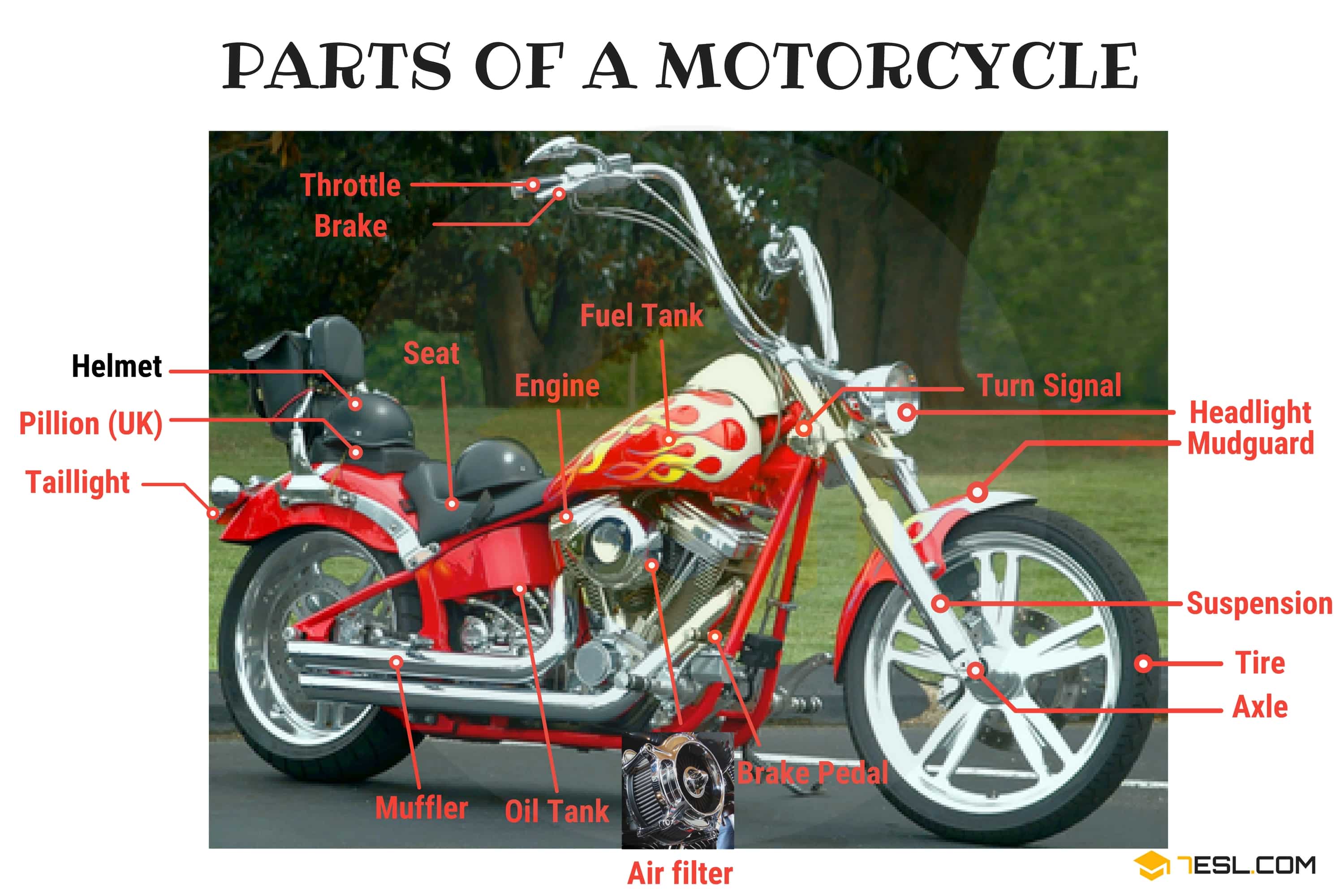What You Didn’t Know About Maintaining Bike Parts Wellington in Humid Climates
What You Didn’t Know About Maintaining Bike Parts Wellington in Humid Climates
Blog Article
Discover the Important Motorcycle Components You Required for Optimum Efficiency
Recognizing the vital parts of a bike is basic for achieving peak efficiency. Each part, from the engine to the braking system, plays an important function in overall capability and safety and security. Regular maintenance can avoid unexpected failings and boost the riding experience. Several bikers ignore the intricacies of these systems. Finding exactly how they function together can cause an extra efficient ride. What vital components should every cyclist prioritize?
The Engine: The Heart of Your Motorbike
The engine works as the core part of a bike, driving its efficiency and specifying its capabilities. It is in charge of transforming fuel into mechanical energy, which powers the bike ahead. Various kinds of engines are employed, including single-cylinder, V-twin, and inline configurations, each offering unique characteristics fit for different riding objectives and styles. The engine size, commonly determined in cubic centimeters (cc), significantly influences performance, with bigger engines generally offering even more power and torque.Furthermore, the engine's design and technology, such as fuel shot systems or air-cooling versus liquid-cooling, impact performance and integrity. Maintenance is crucial for peak procedure; aspects like normal oil modifications and monitoring ignition system guarantee durability. Bikers frequently take into consideration an engine's responsiveness and smoothness, as these attributes boost the total riding experience. Eventually, the engine remains an essential aspect that specifies not only the motorcycle's efficiency however additionally the rider's connection to the equipment.
The Transmission: Changing Gears Smoothly
The transmission plays a necessary role in a motorbike's efficiency, particularly in the technicians of equipment shifting. Recognizing just how to move equipments smoothly can enhance the total riding experience, while routine maintenance guarantees peak performance. Correct focus to these aspects can greatly influence the long life and efficiency of the bike.

Gear Shifting Mechanics
Smooth equipment shifting is vital for suitable motorcycle efficiency, considerably influencing both velocity and control. The auto mechanics of gear changing entail the interaction in between the clutch, equipment lever, and transmission system. When a cyclist engages the clutch, it disengages the engine from the transmission, permitting for a gear modification without damaging the elements. A well-timed release of the clutch, combined with exact movement of the gear lever, promotes a seamless change between gears. This procedure ensures that the engine runs within its finest power band, boosting performance. Bike Parts Wellington. Furthermore, comprehending the gear ratios and their result on speed and torque can aid motorcyclists make informed options during shifts, eventually contributing to an extra receptive and pleasurable riding experience
Upkeep Tips Value
Routine maintenance plays an important function in ensuring that the transmission system operates effectively, allowing for smooth equipment shifts. Frequently altering the transmission and examining fluid is essential, as old liquid can result in boosted friction and wear. Furthermore, evaluating the clutch for wear guarantees peak interaction and disengagement, avoiding slippage throughout gear changes. Lubrication of relocating components is similarly vital to decrease friction and enhance performance. Motorbike proprietors need to likewise monitor for leaks and unusual sounds, as these can indicate underlying issues. By sticking to these upkeep ideas, bikers can extend the life-span of their transmission system, assuring that gear changes continue to be seamless and adding to the total performance of their motorcycle.
The Braking System: Ensuring Safety And Security on Every Trip
Braking systems are basic elements that straight influence a motorbike's security and performance. They contain numerous components, including brake pads, blades, calipers, and hydraulic lines, all interacting to ensure reliable deceleration. The sort of braking system-- normally either disc or drum-- impacts responsiveness and quiting power.Regular maintenance is vital to support peak performance; worn brake pads can result in reduced efficiency and boosted stopping distances. Furthermore, the high quality of brake fluid must be monitored, as it can absorb moisture with time, compromising braking efficiency.Riders ought to also consider the importance of anti-lock braking systems (ABS), which avoid wheel lockup throughout sudden quits, boosting general security. Effectively functioning brakes are not almost stopping; they instill confidence in the rider, allowing for safer navigating via numerous surfaces. Eventually, a dependable braking system is essential for delighting in every trip with peace of mind.
The Suspension: Enhancing Comfort and Control
A well-functioning shock absorber greatly adds to a motorbike's overall efficiency, matching the efficiency of the braking system. The suspension plays a considerable function in taking in shocks from unequal surfaces, guaranteeing a smoother adventure while keeping tire call with the roadway. This contact is crucial for both stability and control, permitting motorcyclists to navigate corners with self-confidence and precision.Different kinds of shock absorber, such as telescopic forks or mono-shocks, provide differing levels of comfort and handling. Correctly tuned suspension enhances responsiveness, supplying the biker with a more connected feel to the motorbike. Normal maintenance checks are essential to determine the suspension elements, including dampers and springtimes, are functioning at their ideal. An effective shock absorber not only boosts the riding experience yet likewise adds to the longevity of other motorcycle components by minimizing deterioration. As an outcome, buying top quality suspension is important for any severe motorbike lover.
The Tires: Attaching You to the Road
Tires play an essential function in a motorcycle's performance, working as the primary link between the roadway and the biker. Understanding the various kinds of tires available can substantially influence managing and security. Additionally, regular upkeep is essential to guarantee peak tire performance and longevity.
Tire Keys In Explained
Just how do various tire types influence a motorbike's performance? Tire kinds play an important role in determining a motorbike's stability, handling, and grip. Sport tires, designed for high efficiency, deal improved traction and responsiveness on smooth roadways, making them suitable for competing and hostile riding. On the other hand, visiting tires focus on resilience and comfort, offering a smoother trip for long-distance traveling. Off-road tires, identified by their tough walk patterns, master traction on unpaved surface areas, suitable for adventure lovers. Furthermore, dual-sport tires blend qualities from both off-road and on-road classifications, accommodating functional riding requirements. Ultimately, picking the ideal tire type is crucial for maximizing performance, ensuring safety and security, and improving the overall riding experience.
Upkeep Tips Offered
While riding when traveling, keeping optimal tire condition is essential for security and efficiency. On a regular basis checking tire stress is essential, as under-inflated tires can bring about poor handling and enhanced wear. It is suggested to check step depth regularly; worn tires compromise grasp and stability. On top of that, riders must look for indications of damage, such as splits or bulges, which can suggest the requirement for substitute. Turning tires periodically ensures even put on, enhancing long life. Maintaining tires clean from particles and staying clear of extreme visuals can extend their life-span. Lastly, preserving proper placement and balance contributes to peak performance, decreasing stress on other bike elements. Complying with these maintenance pointers will substantially boost the total riding experience.
The Gas System: Sustaining Efficiency and Performance
The gas system plays a vital duty in maximizing a motorbike's performance and efficiency, as it guarantees the optimal delivery of fuel to the engine. It consists of several crucial elements, consisting of the gas container, gas pump, gas filter, and fuel injectors or carburetor. Each part has to operate effectively to guarantee a smooth and effective ride.The gas tank shops gasoline and provides it to the engine through the fuel pump, which creates the required pressure. A Recommended Reading fuel filter stops pollutants from getting in the engine, while the injectors or carburetor mix gas with air for combustion.Proper upkeep of the gas system is crucial; a blocked filter or malfunctioning injector can result in reduced performance and enhanced fuel consumption. By confirming that the gas system runs successfully, riders can delight in improved throttle response, better gas economic situation, and overall boosted riding experience.
The Electric System: Powering Your Experience
An effective electrical system is important for the overall functionality and safety and security of a motorcycle, as it powers important parts such as the ignition, lights, and different electronic systems. This system includes the battery, which shops energy, and the alternator, in charge of creating power while the engine runs. The electrical wiring harness links these components, ensuring reliable power distribution.Additionally, integrates secure the system from overloads, while relays help regulate high-current gadgets with low-power signals. A well-kept electrical system boosts performance by making certain smooth begins and consistent operation of lights and signals, vital for rider exposure and safety.Regular checks of the battery's why not try here fee and connections are necessary for avoiding electrical failings. Cyclists ought to likewise evaluate wiring for deterioration, making certain all components work preferably. Inevitably, a robust electrical system contributes substantially to the overall efficiency and dependability of the motorbike.
Regularly Asked Inquiries
Exactly how Commonly Should I Replace My Motorcycle's Battery?
The regularity of motorbike battery replacement relies on use and maintenance (Motorbike Components NZ). Usually, batteries need to be replaced every 3 to five years. Normal checks can assist determine when a replacement is necessary for peak performance
What Devices Do I Need for Basic Motorbike Upkeep?
For basic motorbike upkeep, one calls for important tools such as a socket collection, wrenches, screwdrivers, pliers, advice tire pressure scale, and a torque wrench. These tools assist in effective upkeep and guarantee the motorcycle runs efficiently and securely.
Just How Can I Boost My Bike's The rules of aerodynamics?
To enhance motorcycle aerodynamics, one need to take into consideration adjusting fairings, utilizing windscreen extensions, optimizing body setting, and lowering general weight. These modifications help reduce drag, enhancing security and gas efficiency during experiences.
What Are the Indications of a Failing Electrical System?
Indicators of a falling short electrical system include lowering lights, trouble starting, irregular tool analyses, and blown fuses. Motorcycle Spares Christchurch. Uncommon scents or rust around battery terminals may additionally indicate underlying problems needing prompt interest for safety and security and efficiency

Just how Do I Select the Right Oil for My Motorbike?
When selecting oil for a bike, one must consider the maker's specifications, viscosity rankings, and the sort of riding. Additionally, conventional versus artificial oil can affect efficiency and engine security, influencing the decision considerably. The engine dimension, usually measured in cubic centimeters (cc), significantly influences efficiency, with bigger engines typically providing even more power and torque.Furthermore, the engine's design and innovation, such as fuel shot systems or air-cooling versus liquid-cooling, influence performance and dependability. A well-functioning suspension system considerably adds to a motorbike's general efficiency, enhancing the efficiency of the braking system. The fuel system plays a crucial function in maximizing a motorbike's performance and efficiency, as it assures the ideal shipment of fuel to the engine. A gas filter prevents impurities from getting in the engine, while the injectors or carburetor mix fuel with air for combustion.Proper upkeep of the fuel system is essential; a blocked filter or malfunctioning injector can lead to decreased efficiency and boosted fuel intake. A properly maintained electrical system improves efficiency by making certain smooth begins and constant operation of lights and signals, vital for biker visibility and safety.Regular checks of the battery's cost and connections are vital for avoiding electric failures.
Report this page